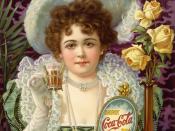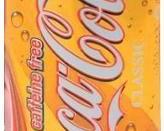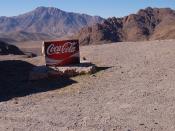Since letters are written without verbal communication, and therefore without inflection, one must depend on the writer's word choice, language, and sentence structure in order to determine the author's tone. In a letter to a small, publishing company called Grove Press Inc., Ira C. Herbert, an executive of the colossal Coca-Cola company, writes to discuss the simultaneous use of a similar tag line in an advertisement - "it's the real thing."
According to Herbert, Coke has been using this tag line since 1942 and Grove Press' use of it to advertise a book, Diary of a Harlem Schoolteacher, is potentially controversial and detrimental to Coke's advertisements. In his letter, Herbert's tone can best be described as haughty. Clichéd and hyperbolically formal phrases such as "called to our attention"(1) and "likelihood of confusion"(10) not only create formality, as is customary in business relations, but a sense of arrogance as well, probably stemming from the obvious difference in size and influence of the conflicting companies.
This arrogance is furthered with a fairly elaborate account of the history of Coca-Cola advertising, thereby enforcing Herbert's true intent of saying "How dare you steal our advertising scheme". His represented company is gargantuan in comparison to Grove Press and, in Herbert's mind, makes the situation all the more important. Herbert also uses a copious amount of complex sentences. While complex sentences are helpful in showing cause-and-effect relationships, in excess they result in pertness. The flippancy suggested also emphasizes Coke's "how dare you" attitude. The audacity alluded by Herbert's sentence structure and the arrogance of him and his company give the implied impression of inferiority toward the receiver and to a third party, depict him as pompous.
Grove Press' rebuttal letter, written by Richard Seaver, is bombastically sarcastic. In response to Herbert's condescending letter, Seaver uses...


